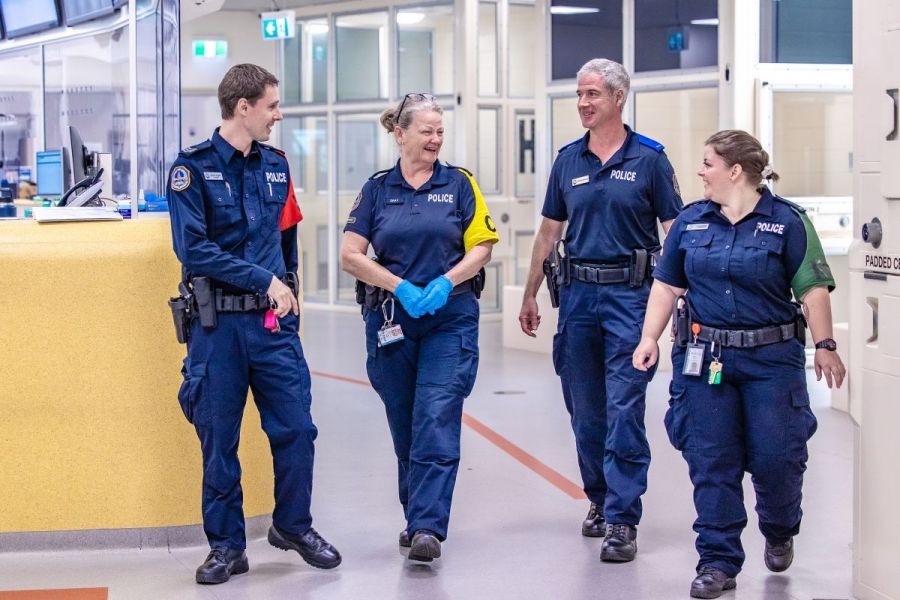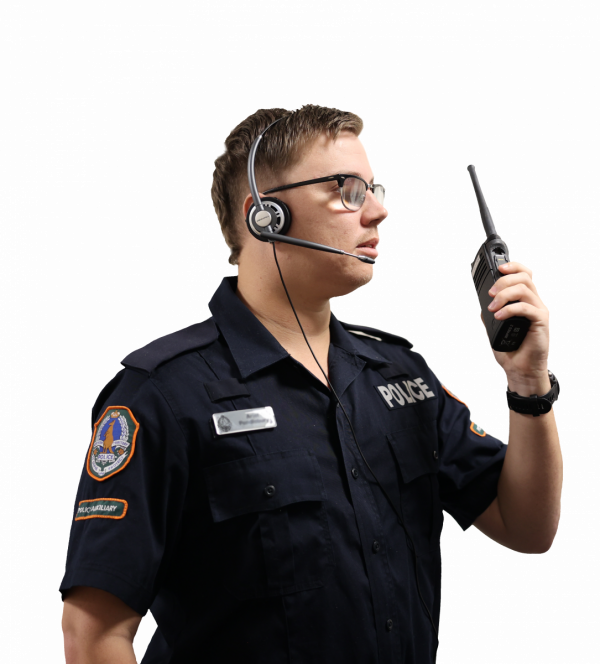Have you ever walked into a police station in the Northern Territory to make an enquiry or report an incident, or ever called Triple 000 for police assistance? If so, it is likely the first person you spoke to was an Auxiliary police officer.

The Police Auxiliary Scheme was introduced in 1992. The aim was to employ sworn officers for police duties, in support of frontline police and to be the main point of contact for members of the public.
There are three streams of employment:
- Communications
Joint Emergency Services Communications Centre (JESCC)
The JESCC is located at the Peter McCauley Centre in Berrimah (Darwin) and was developed using state of the art computer and radio equipment to facilitate the merging of the Police, Fire and St John Ambulance communications needs into the one centre.
The JESCC staff undertake the duties of ‘Call Takers’ and ‘Dispatchers’ and include, but are not limited to:
- maintaining radio communications with patrol units, dispatching jobs and taking results; providing support in the form of information checks and monitoring safety of the police officers and data entry;
- provide support for all police stations within the Northern Territory; and
- to keep the Emergency Operations Centre (EOC) in a constant state of preparedness for large-scale emergencies (e.g. terrorism, cyclone, flooding, fire and other natural disasters).
- Frontline
Frontline Auxiliaries are required to have a level of fitness necessary to undertake Defensive Tactics and will be required to pass the Fit for Purpose Physical Assessment.
All Frontline Auxiliary recruits will be cross-trained in the roles of Police Watch House, Front Counter operations and Police Auxiliary Liquor Inspector (PALI) duties.
- Watch house
The Watch House is where a person is taken to if they are detained by police for any reason. As an Auxiliary your main role is to ensure that all prisoners under the control of the Northern Territory Police in the Watch House are kept in safe custody, with due regard for their welfare and safety.
The duties of Watch House staff include, but are not limited to:
- receiving, safe custody, welfare, bailing and movement of prisoners at the Watch House;
- accurate recording of all details relating to the reception/custody/welfare/bailing/movement of prisoners in the appropriate journals and computer systems;
- the safe custody and return of all prisoner property;
- performing all duties at the court cells and ensure the safety of all members of the judicial system;
- maintaining currency in first aid, resuscitation procedures and defensive tactics/restraint procedures; and
- undertaking the escort of prisoners from remote locations via Northern Territory Police Air Wing or vehicle, as required.
The opportunities and duties available to frontline auxiliaries include:
- Front counter
Front Counter Auxiliaries are the first point of contact for members of the public when attending a Northern Territory Police Station in our major centres. The role entails courteous and effective service to all clients requesting assistance.
The duties of Front Counter staff include, but are not limited to:
- completion and initial actioning of crime reports, accident reporting, lost property reports, and similar tasks that are reported at the front counter;
- registering and issuing firearms and shooters licences subject to the necessary approval process; accurate recording of Bail and Community Service Order reports and matters relating to Domestic Violence Orders;
- accurate recording and safe custody of all property/exhibits received; and
- ensuring that shift and/or patrol supervisors are promptly appraised of situations reported at the front counter that require an operational response.
- Watch house
The Watch House is where a person is taken to if they are detained by police for any reason. As an Auxiliary your main role is to ensure that all prisoners under the control of the Northern Territory Police in the Watch House are kept in safe custody, with due regard for their welfare and safety.
The duties of Watch House staff include, but are not limited to:
- receiving, safe custody, welfare, bailing and movement of prisoners at the Watch House;
- accurate recording of all details relating to the reception/custody/welfare/bailing/movement of prisoners in the appropriate journals and computer systems;
- the safe custody and return of all prisoner property;
- performing all duties at the court cells and ensure the safety of all members of the judicial system;
- maintaining currency in first aid, resuscitation procedures and defensive tactics/restraint procedures; and
- undertaking the escort of prisoners from remote locations via Northern Territory Police Air Wing or vehicle, as required.
- Liquor inspector
The key function of a PALI is to communicate effectively with staff, licensees and customers of liquor outlets to ensure alcohol-harm minimisation strategies are undertaken in a professional and appropriate manner.
The duties of PALI staff include, but are not limited to:
- positive role modelling and mentoring to members of the community;
- policing alcohol purchases through a point of sale intervention in line with legislative powers afforded by the Police Administration Act and Liquor Act;
- support frontline policing services by providing safe and secure custody of people in their care and contributing to other operational policing aspects;
- representing the NTPF by effective engagement in a sensitive manner when dealing with local community and service providers;
- assisting in the promotion of awareness of social issues around alcohol harm and harm minimisation strategies undertaken by the NTPF;
- striving to create an environment that offers personal safety and the protection of personal property; and
- assuming responsibility for the immediate welfare of all persons in their custody.
- Read more!
After completing an initial posting, opportunities to specialise in other fields may also be available. These duties could include:
- Road policing
- Intelligence
- School based policing.
The Northern Territory Police Force recognises and values different characteristics of all applicants and the ‘ages and stages’ of their lives. We are committed to strengthen our capability through diversity and welcome applications from everyone. Women and Aboriginal and Torres Strait Islander people are encouraged to apply.

Training
The Recruit Auxiliary training course is delivered by staff from the Northern Territory Police Fire and Emergency Services College. Recruits are provided the initial induction and instruction into the NT Police Force Auxiliary roles and are paid for the duration of the training, which ranges between a minimum of 7-16 weeks, dependent on the stream applied for.
Following induction training, Auxiliary police officers will be placed in their specific stream in their nominated regional centre (Darwin, Katherine, Alice Springs or Tennant Creek) where the remainder of the 12 months probation is served.
At the successful completion of all requirements, participants will be awarded a statement of attainment for one or two (dependent on stream) units of competency towards the nationally accredited qualification Diploma of Policing (POL50124) by the NT Police, Fire and Emergency Services Registered Training Organisation (RTO Number 0384).
Minimum requirements
Auxiliary applicants must:
- at the commencement of training be at least 18 years of age
- be Australian citizens or have permanent resident status, a New Zealand citizen or a New Zealand citizen residing in Australia under a Special Category Visa
- have Year 10 or equivalent education level; or a completed trade certificate; or be able to demonstrate considerable employment experience and life skills
- have the ability to pass an assessment consisting of computer based cognitive and psychological testing
- be physically fit and healthy
- have general computing skills
- be of good character
- possess qualification equivalent to Provide First Aid (also known as Apply First Aid/Senior First Aid).
In addition applicants for individual streams must meet the following criteria:
Communications
- The ability to obtain a Typing Certificate indicating a typing ability of 40 words per minute with 95% accuracy.
Frontline
- Have general computing skills, including the use of Microsoft Word, email, internet and typing.
- Have an ability to complete the NT Police Fitness Assessment.
- Possess a current provisional or open driver's licence to drive a manual vehicle.
Selection process
If your initial application is approved the below processes will follow:
- Suitability background checks will be performed to identify any criminal/traffic offences.
- Cognitive assessment.
- Panel interview.
- Fitness assessment (frontline auxiliaries only)
- Referee checks.
- Pre-employment medical.
- Probity checks.
(Please note: candidates who fail to meet the required standards may be excluded from submitting an application for a determined period and will be notified in writing).
If you have any questions, you can contact the NT Police Recruitment at ShapeYourFuture@pfes.nt.gov.au or call 1800 005 099.
Relocation expenses
Relocation assistance, up to $20,000, may be available, however, any such assistance will be in the form of reimbursement only, upon provision of satisfactory evidence of expenditure incurred.
Study assistance
Availability of study assistance on application for approved study.
Remuneration and allowances
Police Auxiliary Officers enjoy attractive remuneration which includes a number of allowances:
| Rank | Base rate | Inclusive of 23% consolidated allowance and 5% GPA |
|---|---|---|
| Recruit Auxiliary | $65,377 | Allowance not paid during training |
| Auxiliary Year 1 | $65,377 | $83,682 |
Consolidated allowance
Consolidated allowance is 23% of the officer’s annual salary. Payment of this allowance starts at the commencement of duties at their geographical location at the completion of training.
General policing allowance
Officers performing certain frontline duties may be entitled to claim the general policing allowance, currently 5% of their annual salary.
Night shift allowance
Officers who work regular rostered shift work, will be paid an allowance of 15% of the officer’s base annual salary converted to an hourly rate and paid for each night shift actually worked.
The above allowances do not apply to Recruit Auxiliaries.
Apply today!



